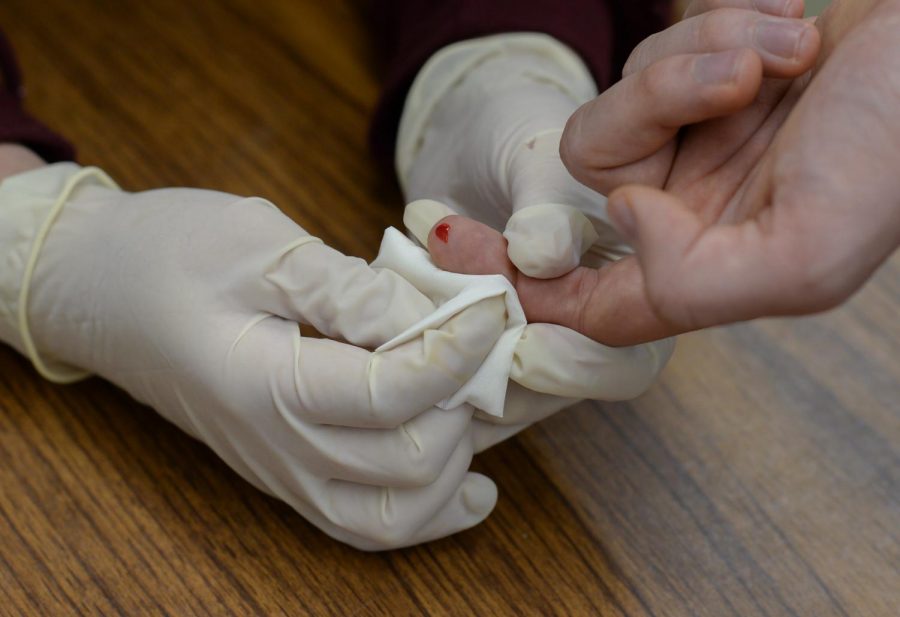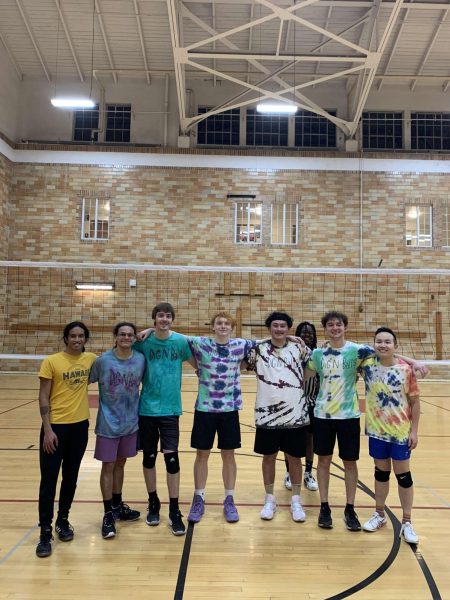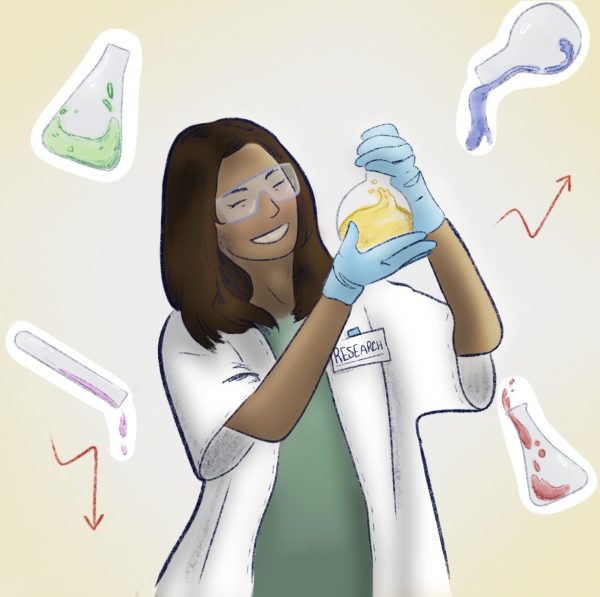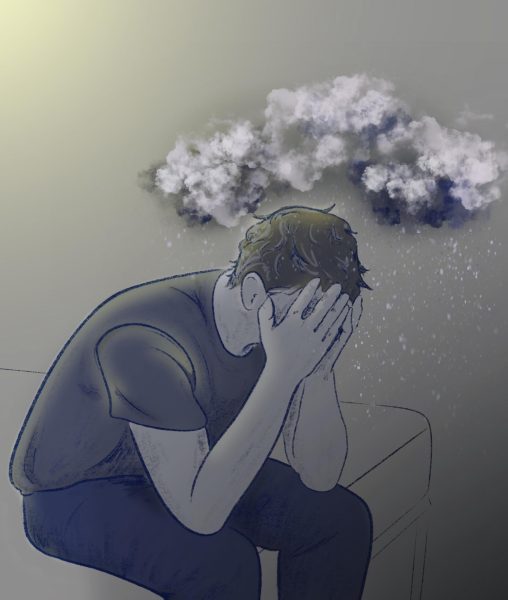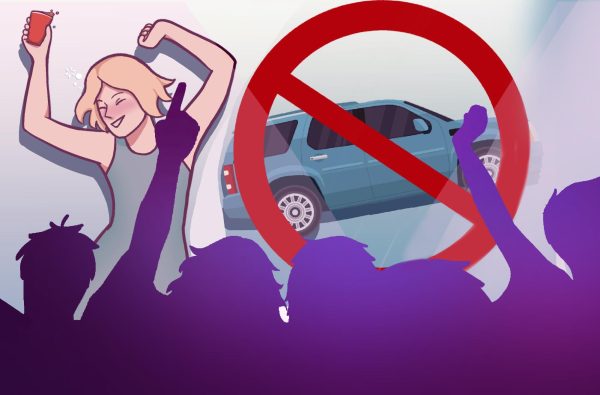Reflections of a gay man on World AIDS Day
HIV epidemic spread during 1980s, groups feel negative stigma
JACQUI THOMASSON | EVERGREEN PHOTO ILLUSTRATION
“Get tested often and know your status,” says Marcella Flores, associate director of research at amfAR.
November 30, 2018
A year ago today I walked into Grace Cathedral in San Francisco, California, a place I loved to visit often. It just so happened to be in the days leading up to World AIDS Day. Hanging between the columns in the nave were original panels from the AIDS memorial quilt first laid on the national mall 30 years prior in 1987.
Between the years of 1980 and 1999, HIV/AIDS tore the city by the wayside. According to the documentary “We Were Here” (which is on Amazon Prime Video for those interested), it struck down 15,548 people in its rampage. The highest percentage of victims were gay males.
HIV stands for Human Immunodeficiency Virus. Marcella Flores, associate director of research at the American Foundation for AIDS Research (amfAR), said the majority of people infected with HIV who do not take antiretroviral therapy (ART) eventually develop AIDS, acquired immunodeficiency syndrome.
AIDS occurs in people living with HIV when the virus depletes the person’s immune system so much that they are unable to fight common pathogens.
“Get tested often and know your status,” Flores said. “The earlier you know the healthier you’ll be. Starting ART early can keep your immune system healthy and could make you a better candidate for future cure interventions.”
As of 2017 there were 36.9 million people living with HIV/AIDS around the world, according to an overview from hiv.gov. A sad fact is that 180,000 of these people were children, many of them living in sub-Saharan Africa. The overview also reported that 21.7 million of these individuals were able to access ART drugs to treat and combat the progression of HIV.
AmfAR was founded in 1985 by Dr. Mathilde Krim and actress Dame Elizabeth Taylor. The foundation dedicates its support to HIV/AIDS research, education, prevention and treatment, and the advocacy of HIV/AIDS-related public policy.
I am a gay man who advocates for HIV/AIDS health awareness and safety. The stigma is not as prevalent in today’s society as it was in in the 1980s, but it’s still a large problem.
In San Francisco, more so than anywhere I’ve lived, there is a bias toward those who identify as HIV positive.
If you open any major gay dating app you’ll see a number of profiles claiming “I’m clean, you be too.” This statement often implies that being HIV positive means you are dirty and undesirable. A negative diagnosis means you are pure, clean and untainted.
The issue is not bias from the outside in, but discrimination from within the community. I cannot tell you how many times I’ve witnessed online dating profiles of acquaintances go from reflecting an HIV positive diagnosis to not displaying HIV status at all.
I often wonder if these individuals have been ridiculed, turned down or ignored simply for having HIV. I feel for them.
Flores said recent research shows that HIV has actually been detected in humans as early as the 1940s or ’50s. Scientists think the virus first infected humans in what is now the Democratic Republic of Congo.
In AIDS lore, she said, a flight attendant known as Patient Zero has been vilified for spreading HIV in the U.S. in the 1980s.
“We now know that Patient Zero is a myth and that HIV existed in the U.S. before this man flew around the states,” Flores said.
The vilification and myth of Patient Zero contributed to the dangerous assumption that HIV/AIDS was a gay virus and disease. This snowballed into a lack of action that public figures couldn’t ignore even when the administration did.
“Elizabeth Taylor established The Elizabeth Taylor AIDS Foundation [ETAF] in 1991 to complement the research amfAR was doing by providing funding to direct care and service programs all over the world,” said Zakk Marquez, program coordinator for ETAF.
A great example of this is the seven mobile health clinics funded by ETAF since 2008 in Malawi.
The group primarily focuses on the Mulanje District, which Marquez said is an HIV hot spot.
The foundation not only offers HIV/AIDS education and treatment, but also malaria testing and life-sustaining health care to 1 million residents of the Mulanje and Palombe districts.
ETAF has also been acknowledged for programs that provide clean syringes to individuals who used injection drugs. These programs help combat the effect of HIV transmission from sharing needles, another leading cause of infections.
In my 25 years of life I’ve had many close calls with HIV. Even though I have advocated for safe sex and periodic testing, I’ve been a hypocrite by not holding myself to those same standards. I’ve had sexual encounters with men without the use of condoms or protection more times than I care to admit.
Today will mark the first time in three years that I have had an HIV test. Whatever the outcome, I will accept the consequences should I have a positive diagnosis. HIV is no longer the death sentence it once was thought to be. We have more advanced treatment. If my diagnosis is negative, this will serve as a wake-up call.
I urge my fellow Cougs to use protection. Get tested, and often.
“Your campus clinic should offer HIV tests, or you can simply walk into any community clinic including places like Planned Parenthood,” Flores said. “If you’d rather test at home, you can buy a test at any pharmacy.”
Pullman’s Planned Parenthood, 1525 SE King Drive, offers testing for most STDs and HIV/AIDS. Pricing depends on insurance coverage.
I will leave you with the quote from the late Diana, princess of Wales, which began my HIV/AIDS research and education advocacy nearly a decade ago: “HIV does not make people dangerous to know, so you can shake their hands and give them a hug. Heaven knows they need it.”


